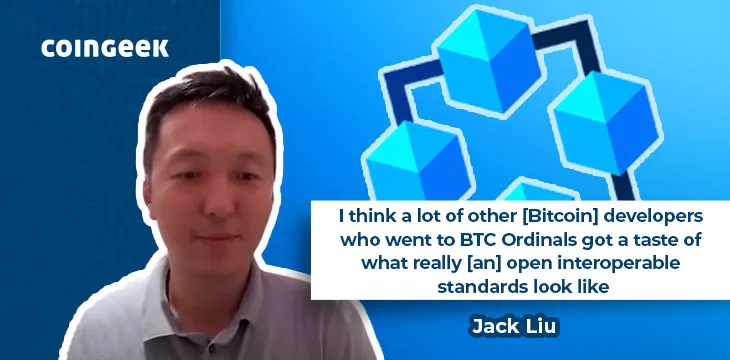|
Getting your Trinity Audio player ready...
|
Bitcoin thought leader Joshua Henslee recently interviewed RelayX Founder Jack Liu. The pair discussed hyperbitcoinization, recent developments on the BSV blockchain, Hodlocker, and much more.
Who is Jack Liu, and what’s his Bitcoin story?
For those who don’t know, Jack Liu is the founder of RelayX and is an active entrepreneur in the BSV blockchain ecosystem. He tells Henslee he first read about Bitcoin in 2013, and shortly after that, he read about the concept of hyperbitcoinization in a paper penned by Daniel Krawisz.
Liu has worked at various digital currency companies. He works on his open projects now. As well as RelayX, his team developed Ordswap—the world’s first trustless Ordinals market built on BTC. He points out that there’s a new narrative about the on-chain economy, and out of this, the idea for Hodlocker was born.
Hodlocker—From inception to a grassroots BSV blockchain movement
Liu looks back at Friend.tech and notes how it did a great job drumming up speculative mania for tokens. He thought of doing something similar on the BSV blockchain, but given how small the community is now, he didn’t think there’d be enough interest.
Wanting to do something new and native to Bitcoin, Liu started with the idea of a leaderboard to display who had locked up the most coins. He didn’t think this would be enough to keep users returning for more, so he held X Spaces, had discussions, and decided that messages and content should be front and center at Hodlocker.
Liu feels the results have vindicated the idea of locking coins. While the number of coins locked is still relatively low, the quality of the content they’re locked against proves the concept will work great. Some big, visionary ideas are being posted, and it’s no coincidence that BSV has pumped since Hodlocker took off.
Henslee thinks the X Spaces and various discussions resonated with the community. When it morphed into a social media application, it all became clearer, he says. Even the initial skeptics are now enthusiastic, and many OG Bitcoiners are on the BSV blockchain, saying how they wish something like this had existed in 2013. Even though it’s still a small group of users, it’s the most used app on the BSV blockchain because it solves many problems. Better yet, this is only the beginning; many more use cases are coming.
Later in the interview, Henslee says he believes Hodlocker alone can get BSV past BTC. We don’t need 1,000 new apps; developers just need to keep adding new features to this one. Liu concurs, saying it won’t take anything like the X user base; even tripling or quadrupling the current user base of around 160 people could have a dramatic effect.
How will it look going forward? Liu says that BSVers who haven’t joined aren’t likely to do so. Future growth will come from outside the current ecosystem.
BSV is gaining on BTC—will it flip it?
Henslee points out how BSV has been gaining on BTC. The Lightning Network has failed, BTC developers are talking about reenabling Opcodes, and there’s a lot of interest in the on-chain economy. Can BSV really flip BTC? He believes so.
Liu says the Ordinals have changed things. New users don’t remember the bitterness of the block size wars; they’re just excited about the utility. They don’t even think about BTC vs. BSV.
The Ethereum camp is also slowly figuring out that it isn’t working out, but they’re on their own timeline and don’t need to rush. The more we do on the BSV blockchain, the more we open peoples’ minds, and Ordinals are definitely bridging the gap between the two camps.
Using an analogy, Liu says that, in politics, even those who personally despised former U.S. President Donald Trump are beginning to adopt some of his ideas.
Henslee points to the recent digital currency token price pumps and the increased liquidity in on-chain tokens like ORDI. He wonders if the BTC block size limit put a cap on the previous ORDI price pump. Liu says yes, but going further, he thinks it put a lid on the development of various protocols and limited their potential. Fees played a role, but people just ran out of things to inscribe and do because of BTC’s inherently limited nature.
Liu notes how it would only take a small fraction of BTC users to want to move to BSV to dramatically alter the 1:600 price ratio. “Liquidity begets liquidity,” he points out. Only hardcore BSV supporters who won’t sell their coins easily are left, creating a second element of supply tightening as demand comes in. If interest comes in from other chains like Solana and Ethereum, the price rise could be dramatic.
To hear more about the future use cases for Hodlocker, the state of the global economy, and much more, check out Henslee’s interview with Jack Liu here.
CoinGeek Roundtable: Locking coins and HODLocker with Joshua Henslee

 03-03-2026
03-03-2026 




